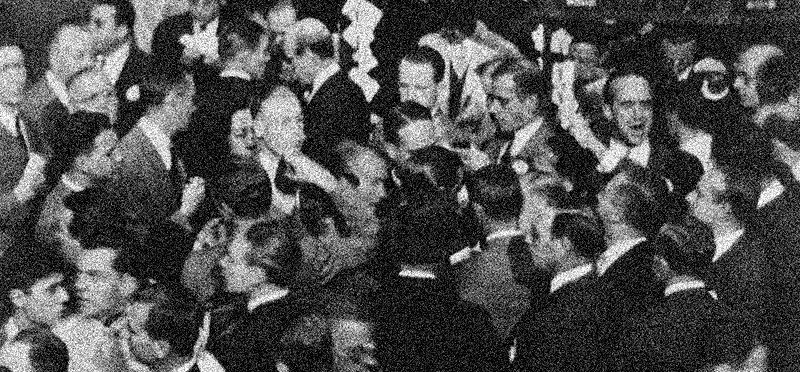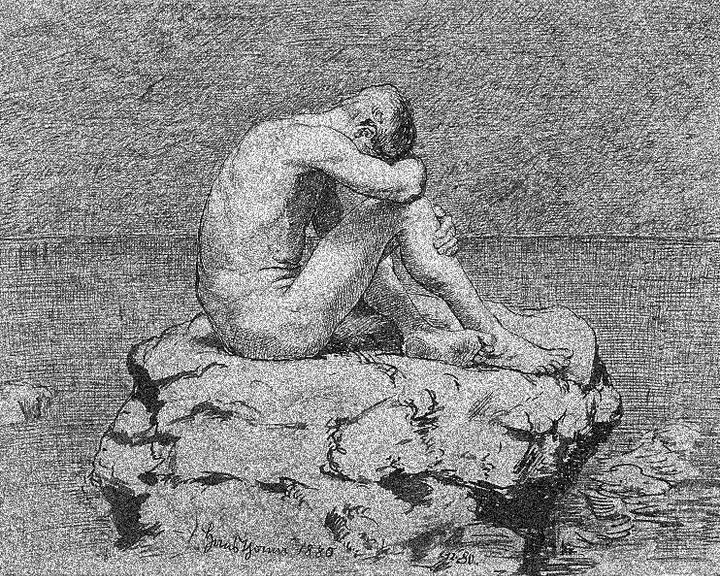The Competitive Personality Then and Now
If anything has changed in the theory of the "competitive personality" since Mills's time, it is that the kind of social personality it outlines is more ubiquitous and embodied more spontaneously.

“The Competitive Personality,” published in Partisan Review in the fall of 1946, contains C. Wright Mills’s discussion of a new type of worker, a sort of mutation of the white-collar employee about which Mills would later publish a groundbreaking sociological study. The competitive personality is an attempt to demonstrate how changes in competitive relationships within the corporatized and bureaucratized life of “monopoly capitalism” produce a corresponding set of alterations in individual personality and behavior, making the work a pivotal piece of analytic social psychology.
In capitalism, competition is both a material force—a question of life and death—and an ideology, a socially necessary illusion that provides a sheen of legitimacy to a rigged system. By providing an analysis of competition that is neither class reductionist nor overly psychologistic, Mills is able to show how both these factors have an effect on how we behave in an economic context. More than that, Mills’s analysis helps us recognize how the intensive and extensive hucksterism that suffuses areas of life that should be oriented to other ends—from politics, to interpersonal relationships, to culture—has made it very difficult to maintain a sense of faith in our social institutions or even our capacity to register the ways commercial imperatives infect daily life.
For Mills, society produces the personalities it needs. A sensible Marxist of a more politically coherent age, Mills believes that when we want to understand the decisions people make we ought to look first to their instrumental interests, which are based in their class position, and only secondarily to ideology. It is not “ideological” for a capitalist to exploit workers for a profit, for the middle class to follow orders and control the workplace on the part of the capitalist, and the worker to obey orders to keep his job, always anxious to outdo his fellows in the eyes of his employer. This is the state of affairs under alienated and unequal social relations, and there is no need to introduce curious and “theological” inversions, fetishes, or identity-based essentialisms to explain these facts.
Competition seeps down to all layers and all relationships. Because the rule of capitalist enterprise is to cut costs, including the costs of labor, there is always an anxious struggle to maintain one’s position, no matter how high or low. Mills’s real contribution comes in his illumination of a particular socio-historical moment of adaptation, the point when workers realized that it was no longer enough simply to get the job done. As Mills puts it, “We may view the true scene of the new entrepreneur’s operation as the personality market … the competition in which these new entrepreneurs engage is not so much a competition for markets of commodities or services: it is a bright, anxious competition for the goodwill of the chieftain by means of personality.”
One of the main theoretical principles of Mills’s analysis is that macro-economic structural shifts are registered in the inner comportment and behavior of workers. Today we are so used to the grimacing smiles of salespeople, the corporate-speak of white-collar workers, the tawdry advertisements tattooed onto celebrities, and the ceaseless reduction of personality to a “brand” that it is hard to imagine the shock that might have been experienced the first time our early capitalist ancestors encountered one of their peers speaking and behaving in the not-yet naturalized language of alienation. Now we are all constantly forced to speak a language that is not our own, the language of commerce and publicity. The scandal now is less that it is an inalienable element of everyday life than that we seem to do it so willingly and without shame.
Mills’s foresight with regard to this transformation is striking. The manic, “frenzied” behavior of the “new entrepreneur … running like Sammy, operating on the duplicitous edges of the several bureaucracies” is an incredible early formulation of the “lean entrepreneur” of today, with his ceaseless and desperate gig-hunting, his showmanship, his dependency on large firms, and his evocations of the confidence man selling an investment opportunity of a lifetime.
Mills makes a distinction between the “heroism” of the pioneering, “skilled” small businessman, striking out on his own in intense competition with others, and the new “unskilled” entrepreneurs who succeed not by superior knowledge but by slavishly impressing the chieftain. But the “pioneers” of our age—Silicon Valley cult figures, tech workers, political activists with large social media followings, and the petit bourgeois strivers of the creative class—all behave like loyal employees, not of any particular firm, but of capitalism as such.
If anything has changed in the theory since Mills’s time, it is that its application is broader, and that the kind of social personality it outlines is more ubiquitous and embodied more spontaneously. It is as if the personality of the bureaucratic lackey and sycophant is the basic comportment of every individual in competition for any work at all in contemporary capitalism. The unemployed speak the language of an invisible corporate cage, previously faceless and anonymous civil servants publicize everything they do on Twitter, and freelancers and gig-economy workers have internalized the ideology of an employer that exists only in potentia.
Today, in an era of downward mobility, capitalism continues to make deeper and more inescapable claims on our inner life. It becomes harder to distinguish the marketed and networked self from who we “really are,” and we are all forced to filter our interpersonal relationships through an algorithm of economic rationality and cultural capital, to transform our identity into a brand in a marketplace, and to liquidate what is left of our stable ego into a chameleon-like reflection of whatever institution we find ourselves in. Opportunities come to those who not only know how to fix things for and assuage the anxieties of superiors, but who are able to bear the daily humiliations and meaninglessness of contemporary life with a smile.
Just as the profile of the entrepreneurial type has become more ubiquitous, so has it become naturalized. We market our personalities for the sheer pleasure of doing it, or else because we see no other outlet for social validation. It has become a basic interpersonal and technically-mediated comportment, a skill we learn at younger and younger ages. There is a sense that we no longer know how else to behave, even if there is no clear economic advantage.
For this reason, the entrepreneurial type has infected spheres of social agency that were previously both ideologically and politically at odds with it. The very same logic of generating followers, spreading “awareness,” producing “thought leaders,” and engaging in an inexhaustible campaign of media promotion has become fundamental to the way we think, for instance, about politics—what we understand political activity to consist of, what our ultimate goals are, and how we generate criteria of success. The competitive personality is an early formulation of certain neoliberal character traits that we have internalized in order to survive. To abandon them would result in very real material disadvantages, and we cannot simply decide by sheer will to stop being what we so deeply are. But it is also incumbent upon us to recognize and, to the extent that we can, reduce their influence within those collective projects aimed at changing the social conditions which make them necessary in the first place.
For the new entrepreneurs, the importance of political ideas does not consist in the insight they generate about how we might most efficaciously change society. Rather, our ideas are always contributions to the dogma of our personal brand. We feel attacked when someone disagrees with us not so much because we are wrong, but because it might result in a drop in value. It is the dissolution of the last vestiges of dignity, and along with these the hope for a better society, to which Mills’s article gives its most eloquent expression.
■
Manuela Maleen is a writer living in Chinatown.



